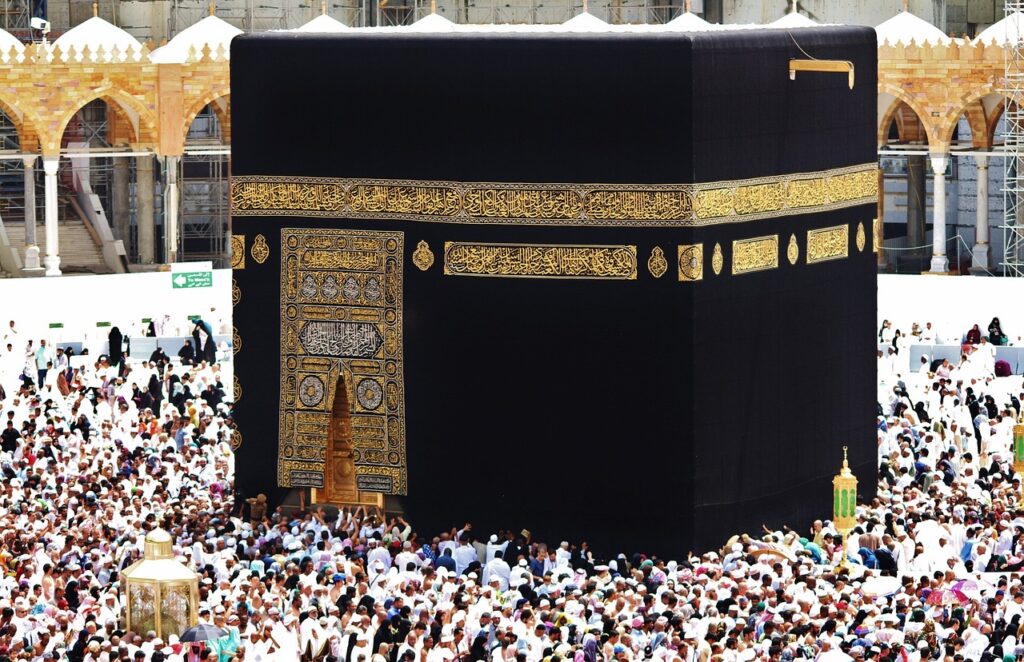
9 years after Hijrah (630 CE), Shirk came to an end.
The nine years following Hijrah (630 CE) signalled the end of shirk. Was a turning point in Islamic history. Although the Prophet Muhammad (PBUH) did not lead the Hajj that year personally, his absence had great theological and political meaning. Supported by references from Sahih Hadiths and early Islamic sources, this article investigates the reasoning for his choice to assign leadership to Abu Bakr Al-Siddiq(RA), the function of Ali ibn Abi Talib (RA) in announcing crucial revelations, and the historical background underlining these events.
Table of Contents
Historical Context: Consolidation and Stability
The Muslim community saw the Conquest of Mecca, a pivotal event that changed the balance of power in Arabia, eight years following Hijrah. But the next year, 9 AH, stayed full of difficulties. Though the Byzantine Empire threatened the northern frontiers, tribes as Hawazin, Thaqif, and Tayy still opposed Islam. Newly converted tribes also sent delegations into Medina, needing the Prophet’s immediate attention to unite alliances and give pledges of fealty.
The Prophet missed the Hajj in 9 AH strategically. Leading a pilgrimage among unsolved problems ran the danger of destabilisation. Rather, he gave top priority to ensuring the fledgling Islamic state could be securely established under Muslim authority the next year on the Farewell Pilgrimage (10 AH), hence transforming the Hajj rites from pre-Islamic practices which is turning point in Islamic history
“The End of Shirk”.| Nine years following Hijrah (630 CE).
An Appointed Trusted Representative by Abu Bakr (RA)
To guide three hundred pilgrims to Mecca, the Prophet assigned Abu Bakr, his best friend and future caliph. This choice underlined Abu Bakr’s constant loyalty and capacity. Important obligations included:
Instruction in Hajj Rituals: Abu Bakr (RA) taught pilgrims the changed procedures, therefore eradicating pre-Islamic practices, including naked Kaaba circumnavigation. “Abu Bakr (RA) sent me along with other announcers to Mina to make a public announcement: ‘No pagan is allowed to perform Hajj after this year…’s,” says Sahih Hadiths in Bukhari via Abu Hurairah, so annuling treaties with polytheists and declaring the end of pagan participation in Hajj which is turning point in Islamic history

Ali’s(RA) task is delivering the last revelations.
Although Abu Bakr(RA) led the pilgrimage, the Prophet later sent Ali ibn Abi Talib(RA) to Mecca to publicly recite Surah At-Tawbah. This choice represented tribal norms and heavenly guidance.
Prophet said, “No one shall transmit this [message] from me but a man from among my household.” Ali’s(RA) pedigree guaranteed the Quraysh would accept the validity of the proclamation as his cousin and son-in-law.
Annulment of Treaties: Ali (RA)confirmed Mecca’s status as a solely Islamic sanctuary by declaring a four-month grace period for polytheists to embrace Islam or leave Arabia. This dual leadership—Abu Bakr (RA)supervising ceremonies and Ali (RA) revealing secrets—highlighted in early Islamic government the complementary responsibilities of trust and divine command.

Theological and Political Ramifications
The ninth Hajj signalled the end of shirk, or polytheism, in pilgrimage customs. Enacted to match monotheistic ideas, the Quranic phrase “The polytheists are unclean; so let them not… approach the Sacred Mosque” (9:28). Prophetic Priority: The Prophet’s emphasis on Medina helped him to complete Islamic teachings, hence transforming the religion (Quran 5:3). The Farewell Sermon of 10 AH resulted from this perfecting of the faith. While Ali’s(RA) journey strengthened his place in the Prophet’s household 612, Abu Bakr’s(RA) leadership anticipated his future as caliph.
“The End of Shirk”-Hadith References and Scholarly Consensus
Multiple narrations in A Sahih Bukhari hadith 369 (sunnah.com) confirm Abu Bakr’s (RA) leadership and Ali’s (RA)declaration.
Divine Timing: The absence of the Prophet matched Quranic knowledge. According to Ibn Abbas, the Hajj of 9 AH was a forerunner to the “perfected” Hajj of 10 AH, which the Prophet personally performed rituals.
Conclusion
The Prophet made a masterstroke of political and spiritual foresight when he chose to send Abu Bakr (RA) the 9th Hajj. He guaranteed the purification of the Hajj, cemented Muslim power, and prepared the ground for the Farewell Pilgrimage—a momentous event in Islamic history—by assigning his closest friends key positions. The occasion emphasises the interaction between strategic leadership and divine direction, ideas still relevant in Islamic tradition.
The nine years following Hijrah (630 CE) signalled the end of shirk.
FAQ: The Prophet’s Absence from the 9th Hajj and Its Historical Significance
1. Why did Prophet Muhammad (PBUH) not lead the 9th Hajj?
The Prophet PBUH prioritised consolidating the nascent Islamic state in 9 AH (630 CE). Following the Conquest of Mecca (8 AH), tribes such as Hawazin, Thaqif, and Tayy continued to resist Islam, while the Byzantine Empire posed a threat to the northern borders. Delegations from newly converted tribes also required his attention in Medina to solidify alliances. Leading the Hajj amid instability risked destabilisation, so he delegated it to Abu Bakr (RA) and focused on ensuring a unified Muslim community.
2. Why did Prophet (PBUH) choose Abu Bakr (RA) to lead the Hajj?
Abu Bakr (RA), the Prophet’s closest companion and future caliph, was renowned for his loyalty, wisdom, and profound understanding of Islamic rites. His appointment signalled trust and foreshadowed his leadership role. He taught pilgrims the reformed Hajj rituals, abolishing pre-Islamic practices like naked circumambulation of the Kaaba. A Sahih Bukhari hadith 369 (sunnah.com) confirms his role in announcing the ban on pagan participation in Hajj.
3. What was Ali ibn Abi Talib’s (RA) role in the 9th Hajj?
After Abu Bakr (RA) led the pilgrimage, the Prophet (PBUH) sent Ali (RA) to proclaim Surah At-Tawbah (Quran 9:1–36), which nullified treaties with polytheists and banned them from Hajj. The Prophet stated, “No one shall transmit this [message] from me but a man from among my household” (Sahih sources). As the Prophet’s cousin and son-in-law, Ali’s lineage ensured that the Quraysh recognised the decree’s legitimacy.
4. What was the significance of Surah At-Tawbah during the 9th Hajj?
Surah At-Tawbah declared Mecca a sacred space exclusive to Muslims, ending polytheistic rituals. It annulled treaties with tribes violating peace agreements and four months to accept Islam or leave Arabia. marked the Hajj’s purification from shirk (polytheism), aligning it with Quranic monotheism (9:28).
5. How did the 9th Hajj pave the way for the Farewell Pilgrimage?
The 9th Hajj established Abu Bakr (RA) as a trusted leader and set precedents for Islamic governance. By delegating authority, the Prophet (PBUH) ensured stability, allowing him to personally lead the Farewell Hajj in 10 AH. There, he perfected Hajj rituals and delivered his final sermon, completing Islam’s spiritual and legal framework (Quran 5:3).
6. What evidence supports Abu Bakr’s (RA) and Ali’s (RA) roles?
Sahih Bukhari (369) and other authentic sources confirm Abu Bakr’s leadership and Ali’s proclamation. Ibn Abbas narrated that the 9th Hajj was a precursor to the “perfected” rites of 10 AH. These accounts underscore scholarly consensus on the event’s historicity.
7. Why was tribal lineage important in Ali’s (RA) mission?
In Arabia, tribal norms prioritise kinship authority. As a member of the Prophet’s household (Ahl al-Bayt), Ali’s (RA) proclamation carried weight among the Quraysh, ensuring the community accepted the divine decree without dispute.
8. What long-term impacts did the 9th Hajj have?
Theological: It eradicated pagan influences, affirming Hajj as a purely Islamic rite.
Political: It solidified Abu Bakr’s (RA) leadership credentials and foreshadowed his caliphate.
Historical: It set the stage for the Farewell Pilgrimage, which unified Arabian tribes under Islam.
9. How does this event reflect the Prophet’s leadership style?
The Prophet (PBUH) balanced divine guidance with strategic pragmatism. By delegating tasks to trusted companions like Abu Bakr (RA) and Ali (RA), he strengthened communal bonds, ensured continuity, and prioritised the Ummah’s stability over his presence.
10. Are there lessons for modern Muslims from the 9th Hajj?
Yes! It teaches the value of:
Trustworthy leadership.
The leadership adapts strategies to prioritise collective stability.
It is crucial to uphold divine principles while navigating political challenges.
References: Sahih Bukhari, Quranic exegesis (Tafsir), and classical biographies like Ibn Ishaq’s Sirat Rasul Allah.
General Disclaimer
“Some images on this blog are AI-generated. They are used for creative purposes and do not represent real photographs.”
